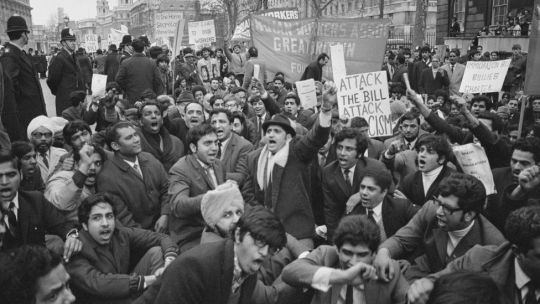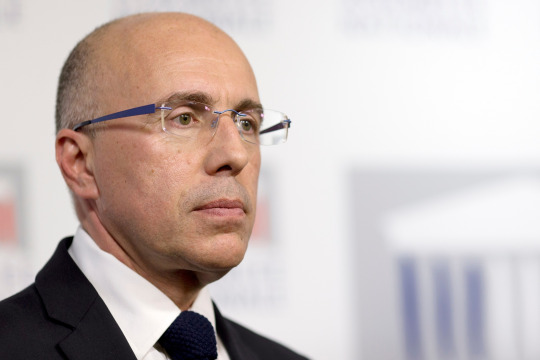#minister of state for labour and employment
Text






#WHY ALL INDIA COMPUTER SHAKSHERTA MISSION(AICSM)#1. It is a National Programme in Information Technology Education and Development.#2. It is an ISO 29990: 2010 Certified institution.#3. Since 1999#AICSM is working across the whole nation with almost 2700+ Authorized Study Center (ASC) and a wide network in 24 states of the country.#4. AICSM is awarded Appreciation Letters from the President of India#Prime Minister#Cabinet Minister#Chief Minister of different states#Governor#the Information and Technology Minister#and other honorable personnel of the country for its excellent work practices and a wide network.#5. Employment and Training Directorate under the Labour and Employment Ministry#Government of India#New Delhi has permit to register trained students of ALL INDIA COMPUTER SAKSHARTA MISSION in Employment Exchange of every district of India#A copy of the above order has been saved in the head office of ALL INDIA COMPUTER SAKSHARTA MISSION#Kota.#6. All courses are registered under the C.R. Act of the Department of Secondary and Higher Education of Ministry of Human Resource Departm#7. Planning Commission of Govt. of India#ALL INDIA COMPUTER SAKSHARTA MISSION is a registered organization from planning commission of Govt. of India#New Delhi under NGO partnership system#for organizing all training programs of the planning commission.#8. National Skill Development Corporation (NSDC) of Govt. of India#New Delhi :#All India Computer saksharta Mission is an authorized training partner of National Skill Development Corporation (NSDC) of Govt of India#New Delhi#for organizing skill development training programs.#9. National Digital Literacy Mission (NDLM)#All India Computer Saksharta Mission is an authorized training partner of govt. of India's National Digital Literacy Mission (NDLM) Project#10. Cooprative Organisations :
0 notes
Text
[Reuters is Canada-Based Private Media]
Bangladesh will raise the minimum wage for garment workers by 56.25%, the first hike since 2019, the junior labour minister said on Tuesday after a week of protests calling for higher salaries.
The minimum wage for workers will be increased from 8,000 taka to 12,500 taka ($114) per month from Dec. 1, State Minister for Labour and Employment Monnujan Sufian said. There will also be a 5% annual increment.
The protests, which led to clashes with police that killed two workers and wounded dozens more, pushed the government to form a panel of factory owners, union leaders and officials to consider the demand for higher pay.[...]
"(Government welfare) cards will be provided to the workers, later the ration cards will be given to them so they can buy essential commodities at cheaper rates," Rahman, also a former president of the Bangladesh Garment Manufacturers and Exporters Association, told Reuters.
Workers, however, are not happy with the rise at a time when inflation is running at 9.5%.
7 Nov 23
[TheDailyStar is Bengali Private Media]
The wage board for garment workers has set the minimum salary at Tk 12,500, a little over half of what workers demand.
Union leaders have rejected the new minimum wage put forth by the wage board, which accepted the proposal of factory owners’ representative Siddiqur Rahman.
The current starting wage is Tk 8,000.
Union leaders yesterday threatened to go for tough demonstrations. Workers had demonstrated for 12 straight days.[...]
Before the announcement, members of the Minimum Wage Board, formed on April 9, held a meeting at its office. While the meeting was going on, union leaders outside chanted slogans demanding a minimum wage of at least Tk 23,000.
Demanding a starting salary of Tk 25,000, Montu Ghosh, president of Garment Sramik Trade Union Kendra, said the measly amount set was not enough to lead a good life. Inflation and high prices of essentials have made things worse for garment workers.
Ghosh along with other union leaders of the Mojuri Briddhite Garment Sramik Andolon, a platform of workers’ unions, in a statement rejected the new minimum wage and called for a rally on Friday where they would announce tougher programmes[...]
If the workers’ unrest continues, the responsibility will lie with the wage board, Nazma said.[...]
[The] president of the Bangladesh Apparel Workers’ Federation, said the prime minister’s intervention is needed in setting the new minimum wage.
He demanded ration cards, not the family cards of the TCB, for the garment workers.[...]
The new minimum wage is much less than those offered in India, Cambodia, Vietnam, China and Indonesia. Only Pakistan has a lower minimum wage.
Early last month, the Centre for Policy Dialogue, after a survey, interviews and research, estimated that the minimum wage for an RMG worker should be Tk 17,568. The new minimum wage falls short of that.
The think-tank had delved into food and non-food expenditure patterns of 228 workers from 76 factories and even considered how many earning members an average RMG worker’s family had.
The CPD had stated that the food cost for an RMG worker family was at least Tk 9,198 a month but notes that the standard food expenditure for a family of four would be Tk 16,529 and that the garment workers have to cut corners to make ends meet.
It said 12 percent of the workers’ families do not buy milk at all, 5 percent do not buy sugar, and 5 percent do not consume fruits.
8 Nov 23
247 notes
·
View notes
Text
The New Democratic Party and a group of labour unions are calling on the federal government to change Canada’s employment insurance rules so that new parents, especially new mothers, are not denied regular EI benefits if they get laid off.
In a letter sent Thursday to Randy Boissonault, Canada’s employment minister, and NDP MP Daniel Blaikie, along with the Canadian Labour Congress, Unifor and the Canadian Union of Public Employees, are demanding an end to “gender discrimination” in the program.
A copy of the letter shared with Global News stated: “Under the current EI Act, special and regular benefits can be combined up to a 50-week maximum. Using qualifying hours for regular benefits reduces what you can claim in maternity and parental benefits, and vice-versa.
“This means that women who have a baby and access maternity benefits lose their protection in the event of a lay-off,” the letter to Boissonnault reads.
Continue Reading
Tagging @politicsofcanada
#cdnpoli#canada#canadian politics#canadian news#labour unions#NDP#employment insurance#gender discrimination#parental leave#layoffs
82 notes
·
View notes
Text
[“Both the US and UK typically tie domestic workers’ visas to a specific employer. As a result, a staggering 80 per cent of migrant domestic workers entering the US find that they have been deceived about their contract, and 78 per cent have had employers threaten them with deportation if they complain. In the UK, these ‘tied visas’ were only introduced – by Prime Minister Theresa May, who was home secretary at the time – in 2012, so it is possible to see their effect very clearly. Migrant domestic workers who entered the UK after 2012 on a tied visa are twice as likely to be physically abused by their employers as those who arrived on a visa that gave them the right to change employers. Compared to migrant domestic workers on the previous, more flexible form of visa, those on tied visas are substantially more likely to be underpaid, assaulted, and overworked, to be expected to sleep on the floor, and to have their passports confiscated by their employers. Punitive immigration law produces harm.
However, much mainstream trafficking discourse characterises the abuse of migrants and people selling sex as the work of individual bad actors, external to and independent of state actions and political choices. Sometimes this discourse works not only to obscure the role of the state but to absolve it. One feminist commentator, for example, writes of the sex trade that ‘criminalisation doesn’t rape and beat women. Men do’. From this, we might conclude that changing the law is pointless because, what makes women vulnerable is simply men. This may feel true for women who do not have to contend with immigration law, police, or the constant fear of deportation, but we can see from the results of tied visas that the legal context – including migration law – is heavily implicated in producing vulnerability and harm.
For undocumented migrant workers looking to challenge bad workplace conditions, penalties do not stop at deportation; instead, these workers face criminalisation if they are discovered. In the UK, someone convicted of ‘illegal working’ can face up to fifty-one weeks in prison, an unlimited fine, and the prospect of their earnings being confiscated as the ‘proceeds of crime’. This increases undocumented people’s justified fear of state authorities and makes them even less able to report labour abuses. Such laws therefore heighten their vulnerability and directly push them into exploitative working environments, thereby creating a supply of highly vulnerable, ripe-for-abuse workers. Increasingly, border enforcement is infiltrating new areas of civic life. Landlords are now expected to check tenants’ immigration status before renting to them; proposals have been floated to freeze or close the bank accounts of undocumented people, and a documentation check was introduced in England when accessing both healthcare and education, as part of an explicit ‘hostile environment’ policy (although both have been challenged by migrants’ rights organisers, including in court). The UK devotes far more resources to policing migration than it does to preventing the exploitation of workers. Researcher Bridget Anderson notes that ‘the [National Minimum Wage] had 93 compliance officers in 2009 and the Gangmasters Licensing Authority [which works to protect vulnerable and exploited workers] had 25 inspectors … The proposed number of UK Border Agency Staff for Local Immigration teams … is 7,500.’
This is the context in which commercial sex frequently occurs. Undocumented or insecurely documented people are enmeshed within a punitive, state-enforced infrastructure of deportability, disposability, and precarity. Any work they do – whether it is at a restaurant, construction site, cannabis farm, nail bar, or brothel – carries a risk of being detained, jailed, or deported. In any work they do, they will be unable to assert labour rights. Even renting a home or accessing healthcare can be difficult. All this makes undocumented people more dependent on those who can help them – such as the people they paid to helped them cross the border, or an unscrupulous employer. It should therefore be no surprise that some undocumented migrants are pushed into sex work by those they rely on, or that some enter into it even if the working conditions are exploitative or abusive.”]
molly smith, juno mac, from revolting prostitutes: the fight for sex workers’ rights, 2018
36 notes
·
View notes
Text
The Livret
“Under the Old Regime, the billet de congé was a document used as an instrument of control by employers. Workers had to hand over this document to their employer in order to be hired. Holding on to this document until a job had been completed to their satisfaction, employers made sure that workers could not leave them at will. The billet was a tool of subordination, since it allowed employers to write down an assessment of their employees that would be considered by the next person to hire them. Falling into disuse during the revolutionary decade, this practice became the object of a widespread debate that led workers, but also bosses and state administrators, to agree that Old Regime rules would not be restored. When the billet de congé was reinstated as the livret ouvrier by the Napoleonic state in 1803, its function was radically transformed by the application of revolutionary principles of reciprocity and equality to labour relations, under the auspices of tribunals and local authorities. The document had thus lost its disciplinary power, and the law that re-established it was in any case largely ignored by employers and labourers alike. Prud'hommes ensured that employers could not retain the livret, even in case of conflict with their employee, and labourers no longer faced criminal charges when unilaterally leaving their bosses. Moreover, according to a frequently reprinted circular by the Minister of the Interior, Montalivet, in 1809, [employers] were expressly prohibited from making any comment about a worker’s performance or ability on the livret itself. Far from restricting it, by acting as a way to establish private contracts (in accordance with customary usages), the livret had in fact become a means to facilitate the worker’s mobility.”
— Xavier Lafrance, The Making of Capitalism in France — Class Structures, Economic Development, the State and the Formation of the French Working Class, 1750-1914, ch. 3, p. 129-130
#The Making of Capitalism in France#livret ouvrier#billet de congé#Montalivet#napoleonic era#napoleonic#first french empire#french empire#history#19th century#1800s#france#Xavier Lafrance#working class#economics#economic history#napoleon#french history#Napoleon’s reforms#reforms#napoleonic reforms#Napoleon’s reforms 2
6 notes
·
View notes
Text

Malawi’s May Days
Under the one-party State, May Day was not a public holiday nor could unions organise independent May Days.
So, the first May Day in independent Malawi was in 1994. Held at the Ryalls Hotel in Blantyre just two weeks before the first multiparty general elections, and 11 months after a referendum in favour of elections, it was organised by the Hotels and Food Workers Union. Held, however, at a luxury hotel, without publicity and in the wake of State repression of dissidents and strikers, the event was poorly attended.
May Day became an official public holiday in 1995 under the newly-elected United Democratic Front (UDF) government – which included Chihana as Second Vice-President.
That year, the Trade Union Congress of Malawi (TUCM) held a widely publicised series of May Day activities at Kamuzu Stadium and a peaceful march. The then minister of Labour, Ziliro Chibambo, was present, as were employer representatives. When the minister saluted workers’ contributions to the independence and democracy struggles, promising to defend workers, the mammoth crowd jubilantly ululated.
That same minister was, however, lambasted by the UDF government, after investors complained bitterly of his speech. By the 1996 May Day commemorations, a new minister of Labour was in office. And only from 2004 did the State President start attending May Day events.
#history#Malawi#May Day#labor#malawian politics#anarchism#resistance#autonomy#revolution#community building#practical anarchism#anarchist society#practical#anarchy#daily posts#communism#anti capitalist#anti capitalism#late stage capitalism#organization#grassroots#grass roots#anarchists#libraries#leftism#social issues#economics#anarchy works#environmentalism#environment
11 notes
·
View notes
Text
Things are only getting worse for Rishi Sunak's Conservative Party in the UK. These are self-inflicted wounds and they're happening just two weeks before a general election in which the Tories are predicted to have their worst showing since World War II (if lucky) or the Napoleonic Wars (if unlucky).
One of Rishi Sunak’s close protection officers has been arrested over alleged bets about the timing of the election.
The officer was arrested on Monday on suspicion of misconduct in public office, the Metropolitan police said in a statement.
The news comes a week on from the Guardian’s revelation that Rishi Sunak’s closest parliamentary aide, Craig Williams, had placed a £100 bet on a July election just three days before the prime minister named the date.
As a result of that incident, the Gambling Commission conducted a wider investigation and found information that led to the decision to investigate the officer.
The Metropolitan police said it was contacted last Friday by the Gambling Commission, which informed the force that it was investigating alleged bets related to the timing of an election by a constable from the Met’s Royalty and Specialist Protection Command.
There's also a scandal involving the wife of Chris Philp – Sunak's Minister of State for Crime, Policing and Fire. Philp takes a hard line on law and order but apparently his wife is engaged in corporate espionage.
Policing minister’s wife reported to CPS over corporate espionage claims
A leading businesswoman who is married to the policing minister, Chris Philp, has been reported to the Crown Prosecution Service (CPS) by a former employer and is being sued in the high court over allegations of corporate espionage.
Elizabeth Philp, 40, whose husband has called for “zero tolerance” to all crime, is accused of data-handling offences and unlawfully using confidential information from her former employer to set up a rival business.
She denies the allegations and is countersuing her former employer, whom she accuses of cyber-attacking the website of the company she subsequently founded.
The pro-Conservative Daily Telegraph on its front page placed a map of 2019 election results next to its projections for the July election. On the UK political color palette: Red = Labour, Blue = Conservatives, Orange = Liberal Democrats, Yellow = Scottish National Party, Light Green = Plaid Cymru (Party of Wales), Medium Green = the Greens.

Wipeout indeed! Savanta, which conducted the poll the Daily Telegraph based its 2024 map on, projects between 481 and 516 seats for Labour (depending on how results are analyzed) in the 650 seat House of Commons.
Sunak may see the writing on the wall and could be thinking of moving to California if he personally gets booted from his seat in the constituency of Richmond and Northallerton. Richmond and Northallerton is currently considered a tossup.
Rishi Sunak’s California escape hatch: His $7.2 million beach home
#uk#uk general election#british politics#rishi sunak#conservative party#the tories#election gambling scandals#craig williams#chris philp#zero tolerance for crime#elizabeth philp#corporate espionage#political cataclysm#tory wipeout#savanta
5 notes
·
View notes
Text


On 18th September 1972, BBC News reported that the first 193 Ugandan refugees, fleeing persecution by the country’s military dictatorship, had arrived at Stansted Airport, Essex. Over half of the arrivals had British passports, and housing and immediate needs would be overseen by the Ugandan Resettlement Board.
Uganda’s Asian community, numbering around 55 000, many of whom ran family businesses and small enterprise, were ordered in August 1972 to leave the country within 90 days by President Idi Amin. Amin had publicly denounced Ugandan Asians as ‘bloodsuckers’, threatening that any who had not left by the arbitrary deadline of November 8th would be interned in military detention camps.
Many of the initial flight of refugees had endured frightening experiences prior to their departure from Uganda, at the hands of Amin’s troops. "On the way to the airport the coach was stopped by troops seven times, and we were all held at gun point," one refugee told reporters. Another stated that he had been robbed of personal valuables and Ugandan currency on the way to Entebbe airport.
News reports at the time cited some opposition within the UK over the acceptance of the Ugandan Asians. The Leicester local authority mounted a newspaper campaign urging refugees not to come to their region seeking jobs and housing. The BBC asserted that, in hindsight, the resettlement programme was seen as ‘a success story for British Immigration’.
The loss of the hardworking and successful Ugandan Asian community devastated Uganda’s agriculture, manufacturing and commerce. Idi Amin was deposed in 1979 and died in Jeddah in 2003, having been responsible for the deaths of as many as 300 000 Ugandan civilians during his reign of terror as President. In 1991, Ugandan President Yoweri Museveni invited the expelled community to return home to help rebuild the economy.
The Wilson Labour government also had to grapple with a refugee crisis from a former African colony.
In February 1968, BBC news reported;
"…Another 96 Indians and Pakistanis from Kenya have arrived in Britain, the latest in a growing exodus of Kenyan Asians fleeing from laws which prevent them making a living…"
Many Asian people living in Kenya had not taken up Kenyan citizenship following the country’s independence from Britain in 1963, but possessed British passports. Under Kenya’s Africanisation policy, non-citizens required work permits, and were being removed from employment in favour of Kenyan nationals. There was growing public demand for laws to prevent non-citizens from owning businesses or even operating as street and market traders. As a result, British passport holders were leaving Kenya at the rate of 1000 per month, leaving a huge deficit in skills and experience within the business community and civil service.
Fearing a backlash over the large numbers of Asian immigrants, Home Secretary, and future Prime Minister, James Callaghan, rushed through the Commonwealth Immigration Act, which made it a requirement that prospective immigrants must have a 'close connection' with Britain.

This led to disagreement in Cabinet, with Secretary of State for Commonwealth Affairs, George Thomson (1921-2008) arguing;
"…To pass such legislation would be wrong in principle, clearly discrimination on the grounds of colour, and contrary to everything we stand for…"
In 1971, the Heath government made further legislative changes that would mean that (some) immigrants from Commonwealth countries would be treated no more favourably than those from the rest of the world, and that tightened restrictions on those who stayed by linking work permits to a specific job and location, requiring registration with police, and reapplication to stay in Britain each 12 months.
The Patrial Right of Abode lifted all restrictions on those immigrants with a direct ancestral connection with Britain.

Home Secretary Reginald Maudling (later famous for being smacked in the face by Irish MP Bernadette Devlin, and for having to resign over a corruption scandal linked with disgraced property developer John Poulson) denied that this was, in effect, a 'colour bar', telling the BBC;
"…Of course they are more likely to be white because we have on the whole more whites than coloureds in this country, but there is no colour bar involved…"
Unsurprisingly, not everyone was convinced.
Vishna Sharma, Executive Secretary of the Joint Council for the Welfare of Immigrants, described the bill to BBC News as, "basically racially discriminatory, repressive and divisive," and added, "It will create divisions amongst the Commonwealth citizens already living in this country on patrial and non-patrial basis. It will create day-to-day bureaucracy and interference on people living in this country. It will create more hardship for people wanting to enter into this country."

(Source; BBC reporting and history.com. Photo Credits; BBC News)
#social history#uk politics#working class history#social justice#uk government#human rights#uk history#british culture#society#history#race relations#immigration
27 notes
·
View notes
Text
French Politics: Revenge of the Sith
MASTERPOST
Previously...
(click the link to see the animation; the text is otherwise available just below)
During Emmanuel Macron's first mandate, the government had it easy. The main challenge was to try and convince everybody in the country that ~le wokisme~ would lead to the end of civilization. It was also seen that having a presidential candidate financially supported by a certain Russian dictator was somehow acceptable. Adding to that, speaking out against the president became essentially banned on television. The 2022 presidential election was characterized by the left acting stupid, the right acting stupid, and the French middle-class being absolutely clueless. However, the left prepared for the legislative elections by uniting under the NUPES name...
So what can you expect to read about in this post?
In no particular order: bad nicknames, a prolonged game of musical chairs, the end of democracy, and Elon Musk. Yes, Elon Musk is involved.

Terribly, thank you.
With Macron re-elected at the end of April 2022, he had to elect a Prime Minister. As is tradition, his previous Prime Minister, Jean Castex, resigned at the end of Macron's first term, after already having replaced Edouard Philippe in the middle of the mandate.
ENTER: ELISABETH BORNE
1) BORNE-OUT

Borne had previously been minister of transport, minister of ecology and minister of labour, employment and integration. She had quite a reputation, as her previous coworkers had nicknamed her "Madame Borne-out" - an obvious play on her name and "burn-out". She was also nicknamed "Madame Bornée" (Madam Stubborn) and, as recently re-discovered, "Méchanta" (a feminized version of the word "Mean").
Obvious Prime Minister material, right?
So an incompetent wimp was followed by sadistic lady with no empathy. Surely things would go perfectly well.

2) LEGISLATIVES
Next came the time to elect representatives at the National Assembly. Wikipedia describes it as the lower house of the French Parliament, the other, higher house being the Senate. We don't care about the Senate (for now), because the National Assembly is what votes on laws, while the Senate theoretically moderates the NA. The NA is more proeminent and its members are elected by the people.
Basically, the National Assembly is the core battlefield of this game of musical chairs.
I know it may be a bit boring, but you need to understand the basics to understand the drama. Think of it as the opening episodes of a Game of Thrones season, before shit hits the fan.
The National Assembly is constituted by 577 members, which means the majority sits at 289 seats. Usually, the president's party has most seats and thus, can basically do what they want.
"Usually."

As stated in the opening crawl, the French Left united until a single name (while still retaining their individual parties): NUPES. Basically, they would support each other and try to put a single candidate in each territory, instead of fighting against each other. Two communist parties opted out, as they didn't appreciate the main (but weakened) left party taking so much space in the coalition.
So here are the key parliamentary groups: NUPES (the left union), LIOT (utilitarian center union; they don't necessarily share views), Ensemble (Together, Macron's union), UDC (the right) and RN (far-right).

"Nobody won," said Gabriel Attal, the government's spokesperson at the time.
Macron's Ensemble party got 245 seats, so they didn't get a majority. For a while, it was thought the NUPES (the left union) might get the majority, but nope, they "only" got 131 seats - still consequent. A very bad surprise, however, came in the form of the far-right getting 89 seats, a historical score and more than the right union (64). However, Nazi newcomer Eric Zemmour didn't secure any seat for his far-right party so hey, we'll take the small victories.
So let's talk alliances: the Left union had 131 seats (32%). The Right (Macron + UDC) had 245 + 64 (38% + 7%). LIOT was a wild card (or rather, comprised of wild cards). You might assume that Macron's party, definitely right-wing, would get on just fine with the other right union, and strategically-speaking, they have 309 seats, that is, the majority.
However... Les Républicains, UDC's main party on the right, is presided by Eric Ciotti.
Let's play a game.


Here are two Nazis. One pretends to follow the same ideas as the government, and one pretends to follow the same ideas as the government. Who's who? You've got two hours.
So the two Right coalitions don't see eye to eye, but don't worry! Gérald Darmanin, Minister of the Interior, said that Marine Le Pen (far-right) was "too soft". He also continually supports cops. So what I'm saying is that the two Right coalitions are enemies but also very similar. Still, a lot of pride and resentment.
This also means the government is majorly fascist. Surely nothing might go wrong.
3) ENTER: 49.3
What is 49.3?

Pronounced /ka.ʁɑ̃tnœftʁwɑ/, 49.3 is an infamous part of the French Constitution. Americans have the Second Amendment, well we have 49.3.
49.3 exists exactly to face the kind of situation that the National Assembly is in: with no guarantee that a law will be approved by the NA, the Prime Minister might be tempted to bypass it completely. In doing so, the Prime Minister opens the possibility for the opposition to submit a vote of no confidence. If the National Assembly approves the vote of no confidence, the law is rejected and the Government is disassembled - only the President stays. That means organizing new Legislative Elections. If the vote of no confidence is rejected, the law is approved, goes to the Senate, then goes back to the National Assembly for a second read.
There's a big limitation to 49.3: you can't use it at will. That would be preposterous. Imagine a Prime Minister using 49:3 eleven times in six months. Couldn't happen, right?
Elisabeth Borne, by whom I really mean Emmanuel Macron, decided to do exactly that.

Ordinarily, the Prime Minister (so Borne) is only able to use 49:3 once per year... except for laws related to finances. And oh, would you look at that, Macron had a big project planned for a long time:
la réforme des retraites
The idea is to basically extended how long we need to the national pool for retirement, before we can retire ourselves and benefit from pension. There's been a fair bit of manipulation here: the government announced they would prolong the length by two years, then less than that, then more.. But it doesn't account for people who do hard work like construction workers and the likes. People die before reaching that age. Among other young people, we often joke that we won't get any pension, but it's out of apathy, really. It's a horrible reform, it creates more gender inequality and most of all, it's unneeded. The government's justification is that it's necessary, otherwise the country will be heavily indebted by 2050, but it's obviously a pretext. Dozens of experts have said he's wrong - but Macron loves to listen to people who agree with him. Know what we could do instead?

Currently, there's a guy who's richer than goddamn Elon Musk. His name is Bernard Arnault. He's the richest (officially) guy in the world. He's also French. He could fund everybody's pension for decades.
So. Anyway.
People were opposed to that reform from the very start, even in 2019-2020. Our deputies at the National Assembly filibustered for a while (basically sending thousands of amendments to be studied, most notably the Left union NUPES, while the Far-Right party RN's attempt at filibuster were lukewarm at best). Macron (through his Prime Minister, Edouard Philippe) used 49.3 to bypass the amendments... but then there were a lot of protests, and do you know what else happened at that time?
COVID-19, our beloved!
One positive consequence of the pandemic was that the government was so busy facing it (with no competence whatsoever, aside from lying a lot to the population) that they just gave up on any bill they were trying to pass.
The pandemic didn't stop, but everyone pretended it did, so here we were in 2022, and Macron was once again trying to make everybody accept his goddamn reform. Once again, filibuster happened and then Macron (through his Prime Minister, Borne) started using 49.3 like there's no tomorrow.
From October to December 2022, Borne used 49:3 ten times. Then on January 23th, 2023...

"Look out! New rule!"
The government taught us there were more than 3 numbers...
Bitches, bros and nonbinary hoes: please welcome 47.1!
Pronounced ka.ʁɑ̃t.sɛtœ̃, 47.1 is the bad guy reappearing after you thought he'd been blown up already, but with broken teeth. It basically says to the deputies:
"Hey, if you don't vote for me quickly, I'll be automatically approved :-) Oh, and you can't filibuster your way through this either <3"
The bill would then go to the Senate (with a shortened debate time too), then again at the National Assembly.
"People know 49.3, it's very unpopular because it's brutal. But nobody knows about 47.1, it makes things easier for us," said a clueless Macron deputy.
People complained, because while they were confused at what exactly 47.1 entailed, they knew it was basically 49.3 with makeup.
Which it was.
4) NO CONFIDENCE
So the pension bill was voted at the Senate on March 11th, 2023. On March 15th, a Joint Committee approved it and added some stuff. On March 16th, the Senate approved the changes.
THEN IT WAS TIME... FOR THE NATIONAL ASSEMBLY... TO VOTE FOR THE BILL AGAIN.
At this point, the bill was more than unpopular. Polls estimated than more than 70% of the French population was against the pension reform. The left-wing NUPES comprising 32% of the seats was very much against the bill. The far-right RN had also made it clear that they were against it (17%), as they'll do anything to be contrarian to the government - they're populists, after all. Even the right-wing-but-not-Macronist UDC (7%) was not very supportive of the bill - contrarians, proud, and a bit clueless too. But some of them truly believe the bill sucks, which is nice. They're not *all* unreasonable.
So Elisabeth Borne used her favorite secret weapon that we were beginning to miss:

i hope you appreciate my quality montage
Borne 49.3'd her way through the bill, inviting everybody to gang up on her for a vote of no confidence.
The next day, Friday, two motions were submitted:
the first one by LIOT, the center alliance. It was the most likely to be approved, contrary to...
the second one by RN, the right-wing party. It wasn't likely to be approved because the RN is (rightfully) stigmatized.
The votes would take place on the following Monday, after the weekend.
5) MONEY IS MAN'S BEST FRIEND

"Nobody asked you." (Arkunir proceeded to ratio Elon Musk a few more times, as well as Macron himself.)
Do you know how to easily get the approbation of a people who's protesting against a financial reform? Just get a billionaire to support you! I'm sure this will not make anything worse. Macron loves dem billionaires, after all he gave the Légion d'Honneur (an official reward) to Jeff Bezos, you know, the Amazon guy, earlier during his second mandate. Macron also has very shady links to McKinsey...
So anyway, what a weekend. Americans started speaking out, complaining about us lazy French (to them, I'll reply: mobilize for your rights!), in particular Elon Musk, who proceeded to get ratio'd (the Twitter equivalent of getting owned) multiple times by French people.
Meanwhile, Aurore Bergé, controversial chief of Macron's party for her many bad faith arguments at the National Assembly, enjoined the right to own up to what some of them had been saying against the bill for weeks. So she basically unintentionally motivated some right-wing deputies to vote favorably to the motions of no confidence.

"Let's all get behind Aurore Bergé!"
Naturally, a lot of people joked about it. Some of us almost thought she was trying to destroy the party from inside.
Monday arrived, and I couldn't do anything except watch the hours-long stream of the National Assembly, starting at 4pm.
One member of every party gave a speech, basically repeating what they'd been saying. It was boring, endless, and it ended with Adrien Quatennens, and oh my god I haven't even talked about him but who cares, he's irrelevant for this portion of our history, but I still had to mention him as he represented people who don't belong to a specific party. I'll probably explain the deal about him when the time comes to talk about the 2027 presidential elections. This post is already long enough as is.
Then the votes finally happened. There was an agonizing 30 minutes to vote, and at the end of the first one (LIOT's)... It hadn't been approved. Basically all of the left, the far-right and LIOT had voted, and we only needed about 25 members of LR (the right who's not with Macron). We got a few of them, but not enough. The second vote was irrelevant. We had lost.
OR HAD WE?
Protests kept going. Actually, protests got bigger. Without much consultation, protests took place in the evening just after the vote.
In fact, as I'm writing this, the protests haven't stopped.
6) So, are we in a totalitarian state?
Study.com did a helpful explanation of what is a totalitarian state that I'll condense in simple points:
Rule by a single party: Macron certainly likes to think that's the case.
Control of the media: You could make a case for this. Officially, we have freedom of speech. Unofficially, journalists can't contradict the president. The medias love to pretend they're neutral when they're decidedly not (and a lot of big medias are owned by a fascist billionaire).
Control of education: Does defunding public education count? Possibly. The state of education in this country is regrettable, in spite of a lot of professors trying their very best.
Control of the population through propaganda, terror and intimidation: Police brutality is generalized, and Darmanin, Minister of Interior, wrongly declared that it was illegal for unwarned protests to take place. The cops enforce this fake rule by fining people who're there with no reason. There is definitely an attempt to quell the rebellion, not by listening to opponents, but by pushing through.
Control of the economy: 11 uses of an anti-democracy failsafe for the economy certainly looks like it.

The Council of Europe, Amnesty International, Reporters Without Borders and Iran (yeah...) called out France for its police brutality. My university has been blocked for a week and a half and has already confirmed that it will be blocked next week as well. There are recordings - actual recordings! - where cops threaten young people, and we know this isn't a rare case at all. Lots of aggression.
A kid just died during his high school final exam because the adults refused to help him.
Marion Game, the French voice of Lois in Malcolm in the Middle or Mallory Archer in Archer, died. She was a beloved actress. I'll miss her.
Not all of this is linked to the rest, but France is having a hard time right now.
7) Remember who the real enemy is
On March 22nd, Macron did an interview at 1pm, obviously speaking to the only part of the population that loves his pension reform: people who're already retired. He repeated what he's been saying for years: "The French people elected me for my program." even though he acknowledged, when he got re-elected, that a consequent (the majority, in fact) part of his voters had only done so to counter the far-right.
Macron also said, "The [Insert offensive term for people who only earn minimal wage] have never had a better purchasing power," which is bold, both because he was even more condescending than usual, and also because EVERYTHING IS HORRIBLY EXPENSIVE.
Around the same time, the French journal Libération said the following:
"When on March 21, Macron said that 'the mob, whichever it is, has no legitimacy compared to the people who affirm its sovereignty through elections', he disowns democracy three times. First off, he disowns any popular aspect of the protests, regardless of what they are, because if the mob has no legitimacy (although it is supported by unanimous unions) over one of the biggest opposition protests of the history of the 5th Republic (even with the support of the vast majority of society, especially among the workforce)... It means a social movement can't be recognized as the voice of the people."
The two other ways, summarized:
Macron's opinion isn't the voice of the people, as he can still act against the nation's interest
opposing "the crowd" and "the electors" disowns social democracy, ie. workers unions, through which the people also speak
I think it's a great formulation of what's going on.

What do you mean, that's not a King Charles?
Things aren't that bad, though. Macron had to ask King Charles III to not come visit France right now. He didn't expect the protests to get worse (for him) after the failed vote of no confidence.
Adèle Haenel, one of the leads in Portrait of a Lady on Fire and real-life lesbian, spoke out in favor of the workers and said feminists had to take part in the fight.

We got our own version of MinetaGate: in an interview given to the main gay magazine in France, Têtu, Olivier Dussopt, the Minister of Labour, said two things:
He came out as gay, which is something that we, the gay community, immediately rejected
He said that the government might need to use 49.3 again
It worked out so well last time...
Anyway...
I'll simply conclude with what the chief of the General Worker's Confederation said in regard to this interview:
"Either [Macron]'s completely unfamiliar with our system and that's very serious, or he's fucking with us."
#french politics#long post#france#macron#49.3#réforme des retraites#pension reform#macron explosion#bravo les lesbiennes#really long post
26 notes
·
View notes
Text
State visit to South Africa – programme
From Wednesday 18 to Friday 20 October 2023, His Majesty King Willem-Alexander and Her Majesty Queen Máxima will pay a state visit to the Republic of South Africa at the invitation of President Cyril Ramaphosa. The King and Queen Máxima will be accompanied on their visit by Minister of Foreign Affairs Hanke Bruins Slot.
The state visit will focus on the excellent ties and equal partnership between the two countries. South Africa is one of the Netherlands’ most important African partners in the areas of economics, politics, culture, education and science. The two cooperate actively on solutions for a more just, inclusive and sustainable future. From the perspective of a shared history, they look forward today on an equal footing to a shared future. Key themes during the visit will be sustainable and inclusive growth, cultural cooperation, human rights and legal equality, and exchanges of knowledge and science.
A knowledge mission headed by Minister of Education, Culture and Science Robbert Dijkgraaf will take place prior to and during the state visit. Minister of Agriculture, Nature and Food Quality Piet Adema will head an economic mission focusing on future-proof farming and horticulture, green hydrogen and circular waste management. Before the official welcome ceremony, Ms Bruins Slot will attend a meeting of the South Africa –Netherlands Joint Commission for Cooperation. Minister of Defence Kajsa Ollongren will also attend some programme events.
Wednesday 18 October – Pretoria
Morning
Arrival at airport
King Willem-Alexander and Queen Máxima will be welcomed at Waterkloof air base in Pretoria.
Blesbokspruit Wetland Reserve
The King and Queen Máxima will visit the Blesbokspruit Wetland Reserve, where they will speak about the challenges South Africa faces with regard to water quality and availability. They will hear about developments in two major Dutch-South African water partnerships, the Blue Deal and Wetskills. With people involved locally, they will discuss lessons learned in the Dutch and South African water sectors.
Apartheid Museum
The King and Queen Máxima will then visit the Apartheid Museum. A brief tour of the museum will focus on South Africa’s history of apartheid, and on the fight against injustice that resulted in its transition to a democratic society whose central tenets are equality before the law and access to justice. They will also speak with judges, activists and artists about the importance of legal equality and accessible justice, with a particular focus on protecting the rights of women and LGBTIQ+ people and the importance of international cooperation on inclusion and legal protection.
Afternoon
Innovation Village (Accelerating the green transition)
The Innovation Village will be a hub for members of the economic and knowledge missions and their local partners, South African businesses, organisations and institutes.
The King and Queen Máxima will meet members of the economic mission, which is focusing on strengthening partnerships between South Africa and the Netherlands in the areas of green hydrogen, circular waste management and future-oriented agriculture and horticulture.
They will also meet members of the knowledge mission, the emphasis of which is on the link between education and the labour market, equal opportunities and the importance of vocational education for the green sectors.
Dialogue on alignment with labour market
King Willem-Alexander and Queen Máxima will speak with representatives of educational institutions, employers and businesses as well as students about South Africa’s high rate of youth unemployment and its shortage of well-trained, skilled workers. In both South Africa and the Netherlands, a shortage of skilled workers is a source of problems in society. The discussion will also address solutions for better aligning education and training with the labour market and creating equal opportunities for young people.
Reception for the Dutch community
At the end of afternoon the King and Queen Máxima will meet Dutch nationals who live and/or work in South Africa during a reception at the ambassador’s residence in Pretoria.
Thursday 19 October – Pretoria and Johannesburg
Morning
Welcome ceremony
President Ramaphosa will welcome the King and Queen Máxima to the Union Buildings during an official welcome ceremony, after which they will have a private meeting.
Delegation meeting
Together with the ministers accompanying them, the King and Queen Máxima will take part in a meeting with the South African president and ministers.
Signing of Memorandum of Understanding
After the delegation meeting, the King and Queen Máxima will attend the signing of a Memorandum of Understanding between South Africa’s Minister for Higher Education and Training, Dr Bonginkosi Emmanuel Nzimande, and the Dutch Minister of Education, Culture and Science, Robbert Dijkgraaf, on stepping up cooperation in further education.
Statement to the media
President Ramaphosa and King Willem-Alexander will briefly address the media.
Government lunch at presidential residence
President Ramaphosa will host a private lunch for the King and Queen Máxima and the ministers accompanying them.
Afternoon
Freedom Park
In the afternoon the King and Queen Máxima will visit Freedom Park, which was created by former president Thabo Mbeki as a memorial to all the South Africans who dedicated their lives to the fight for freedom and dignity, including in the struggle to end apartheid and the struggle for liberation in South Africa. The King and Queen Máxima will walk along the Wall of Names commemorating South Africans who died fighting for their country’s freedom, and see the names of three Dutch nationals who also helped oppose apartheid. In recognition of all of these individuals, the King and Queen Máxima will lay a wreath at the eternal flame.
Finally, the King and Queen Máxima will visit an exhibition of work by two witnesses to the fight against apartheid, two photographers who are passing on their experience to a new, younger generation. The exhibition will also include work by members of this younger generation, who will speak with the King and Queen Máxima.
Return hospitality
To thank president Ramaphosa for his hospitality during the state visit, the King will host a cultural performance. In the State Theatre in Pretoria, Lloyds Company and Dutch musicians will perform their show ‘Unbreakable’ along with the South African dancers of the Soweto Skeleton Movers.
Evening
Departure
The King and Queen Máxima will fly to Cape Town in the evening.
Friday 20 October – Cape Town
Morning
Meeting with the Premier of Western Cape province
The Premier of Western Cape province, Alan Winde, and Cape Town mayor Geordin Gwyn Hill-Lewis will welcome the King and Queen Máxima to Cape Town.
Shared past
King Willem-Alexander and Queen Máxima will reflect on the two countries’ shared past during a visit to the Iziko Slave Lodge. While there, they will watch and listen to various performances that bring the history of slavery to life through poetry, music and dance.
Guga S’Thebe Cultural Centre
At the edge of Langa township is the Guga S’Thebe Cultural Centre. Here, the King and Queen Máxima will talk with young South Africans and representatives of civil society organisations about their experiences of combating gender-related violence, which South Africa and the Netherlands both grapple with. By sharing experiences and learning from each other, countries can work together to find solutions for this and other societal problems. The visit will close with a performance by local young people on gender-related violence.
Afternoon
National Botanical Garden
In the afternoon, King Willem-Alexander will visit the Kirstenbosch National Botanical Garden. He will speak with experts from the World Wide Fund for Nature and the South African National Biodiversity Institute on the importance of biodiversity in habitat and wildlife protection.
HortiDemoCentre
Queen Máxima will spend the afternoon at the HortiDemoCentre, a public-private Dutch-South African initiative in Stellenbosch, where she will speak with students and young farmers. The centre develops methods for producing healthier food using fewer resources.
Reception for the Dutch community in Cape Town
The third and final day of the state visit will close with a reception for the Dutch community in Cape Town.
6 notes
·
View notes
Text
Helsingin Sanomat tells readers that the widespread political strikes in Finland starting Monday will effectively halt freight traffic and disrupt fuel distribution for two weeks. The strikes, which hit ports severely, will hamper Finland's export industries such as technology, forestry and metals.
At the same time, the action now beginning will further increase the toll of strikes on the Finnish economy. It is impossible to give an exact figure, but the Confederation of Finnish Industries (EK), for example, estimates that recent strikes have already cost Finland well over a billion euros.
HS interviewed three strikers for a Monday morning feature.
The paper says that recent statements by Prime Minister Petteri Orpo (NCP), in which he stressed that the government will not compromise on the basic line of its plans to limit the right to strike and will expand local labour agreements, make workers' representatives see red.
"First of all, the right to strike will be restricted, which means that we would not be able to strike against government decisions. We would be deprived of the means to influence the situation," says Timo Mällinen, the chief shop steward at SSAB's steelworks in Raahe.
According to Mällinen, it is great that Finland enjoys democracy, and the freedom of opinion that goes with it. He says that he fears that the government's decisions are eroding democracy piece by piece.
Employers have argued that with these strikes, workers are shooting themselves in the foot and causing more unemployment.
For example, Ilkka Oksala, director for work and social affairs for the Confederation of Finnish Industries, told HS in early February that "employees are endangering the financial sustainability of their own companies and thus their own jobs".
The same message has since been repeated several times by employers.
According to Mällinen, the employer side has been making the same point for decades when they have wanted to voice opposition to strikes.
"Employer propaganda. The companies that go bankrupt because of this strike are hardly viable anyway," Mällinen counters.
Pasi Boehm, who heads the union chapter representing stevedores in Helsinki, argues that strikes in countries such as France and Germany are much more frequent than in Finland and have not caused unemployment there.
Sami Ryynänen, chief shop steward at Neste's Porvoo refinery, told Helsingin Sanomat that the strikes will continue as long as necessary. And at least so far, workers have shown strong support for the strikes.
All three of the union activists interviewed by the paper are in full agreement that any solution to the the impass will require negotiations.
"I hope that common sense will prevail and things would be resolved by agreement. Agreement will produce much more sustainable and workable solutions than government dictates," says Ryynänen.
Resisting government policies
Ilta-Sanomat writes that trade unions have been on a collision course with the government since last autumn.
The unions have already opposed changes to labour legislation by striking on several occasions over the past few months. The first round of strikes this year took place at the end of January and beginning of February.
Trade unions were outraged last summer when the government issued a list of ways it wanted to change labour legislation in its government programme.
The papers lists some of the most contentious plans by the government, starting from cuts to unemployment benefits and making the first day of sick leave unpaid, as well as changing the law to make it easier for employers to dismiss workers.
Another sore point for unions is that the government programme undermines national collective agreements by stating that local agreements will be allowed in all companies. The aim is to extend local agreements by removing certain prohibitions on local agreements in current labour law.
Additionally, IS points out, the government wants to limit the right to carry out sympathy strikes. If passed, government plans would redefine legal industrial action as that which is "reasonable in relation to the objectives pursued and whose effects are limited to the parties to the labour dispute".
The right to political industrial action will also be restricted. Government plans would limit the duration of political strikes to only one day.
Hard on the economy
Iltalehti points out that 96 percent of Finland's foreign trade passes through the ports that are being hit by the strikes that started Monday morning.
It writes that according to a preliminary estimate by the Confederation of Finnish Industries, the two-week strike will cause 320 million euros in damage to Finland's gross domestic product.
The strikes may cause disruptions in the distribution of fuel. Iltalehti refers to a statement to by the Industrial Union saying that petrol stations and airports will run out of fuel as a result of the strike. Retailers, on the other hand, expect there may be shortages at individual petrol stations. A possible spike in demand could also have a knock-on effect on fuel prices.
According to the National Emergency Supply Agency of Finland, the strike will not have a significant impact on the security of supply. It says that the availability of jet fuel is likely to be a challenge, but there is unlikely to be a need for any drastic measures.
Grocery chains say that the strike may affect the availability of individual products on store shelves. Overall, food shelves should not be empty because of the strike.
The strike may also indirectly affect domestic production, which uses raw materials or packaging materials imported from abroad. However, urgent consignments of goods can be delivered to Finland even while stevedores are on strike, by using special equipment to unload ships.
Buckle up, use hands-free
Savon Sanomat is among the papers carrying a STT Finnish news agency report that police will step up enforcement on the use of seat belts and the use of mobile phones in traffic this week.
According to a study published last autumn, seat belt use could have saved more than half of the deaths in motor traffic accidents in Finland between 2017 and 2021. During those years, a total of 198 people died in motor vehicle accidents in the country.
Police are reminding motorists that not wearing a seat belt can lead to a 70 euro fine or, in the worst case, the cost one's life or the life of someone else.
In addition to the use of seat belts, police will also be on the look out for drivers not paying attention to vehicle operation. The law says that mobile phones and other devices must not be used in a way that interferes with or endangers driving and that includes holding and using a mobile phone while driving.
Rain, sleet and snow
As Iltalehti notes, the weekend offered us a taste of sunny spring weather.
Over the next couple of days, we should still be able to enjoy moderately cool weather and sunshine, but there will be a change mid-week.
The paper points to a fresh forecast by Foreca, according to which skies will cloud up on Wednesday, bringing rain, snow and sleet around the country.
There will be light scattered showers throughout the latter part of the week, coming down in the form of rain in the south, snow in the north, and a mix of snow and sleet in central regions.
2 notes
·
View notes
Text
Dr. B.R. Ambedkar
Dr. B.R. Ambedkar, whose full name was Bhimrao Ramji Ambedkar, was a prominent Indian jurist, social reformer, economist, and politician. He was born on April 14, 1891, in the town of Mhow in the Central Provinces (now in the Indian state of Madhya Pradesh). Ambedkar was born into a Dalit family, historically marginalized within the caste system in India, which deeply influenced his life's work.
Here's a brief overview of his life and contributions:
Education: Despite facing discrimination and social barriers due to his caste, Ambedkar managed to pursue education with determination. He obtained his undergraduate degree in economics and political science from Bombay University and went on to complete his master's degree in economics and his D.Sc. in economics from the University of London. Later, he also earned a law degree from the London School of Economics.
Social Reformer: Throughout his life, Ambedkar fought against social discrimination and caste-based inequalities in India. He worked tirelessly to uplift the Dalit community, advocating for their rights and dignity. He was a staunch supporter of social justice and equality for all.
Contribution to Indian Constitution: Ambedkar played a pivotal role in the drafting of the Indian Constitution. He was appointed as the Chairman of the Constitution Drafting Committee and is often referred to as the "Architect of the Indian Constitution." His vision for a democratic and inclusive society is reflected in the principles enshrined in the constitution.
Political Career: Ambedkar was also a prominent political leader. He served as India's first Minister of Law and Justice in the newly independent country's first cabinet. He also held other ministerial positions, including Minister of Labour and Principal Architect of the Constitution. He was elected as a member of the Constituent Assembly of India.
Advocacy for Dalits and Marginalized Groups: Ambedkar dedicated his life to the upliftment of marginalized communities, particularly Dalits. He fought for their social, economic, and political rights, advocating for measures such as reservations in education and employment to address historical injustices.
Conversion to Buddhism: In 1956, Ambedkar publicly converted to Buddhism along with thousands of his followers, rejecting the caste system and embracing Buddhism as a path to equality and social justice. This event is known as the "Dhamma Chakra Pravartan Din" or the "Conversion to Buddhism Day."
Dr. B.R. Ambedkar passed away on December 6, 1956, but his legacy continues to inspire movements for social justice and equality in India and beyond. He is widely revered as one of the greatest social reformers and political leaders in Indian history. His birthday, April 14th, is celebrated as "Ambedkar Jayanti" in India, honoring his contributions to the nation.
2 notes
·
View notes
Text
The fact that the recently elected Swedish government is a right-wing one that relies on a neo-/postfascist party, the Sweden democrats, to govern has really radicalized me. Or at least strongly reinforced my conviction that we need to abolish capitalism. I live in Sweden and I’m honestly afraid what might happen. So I started thinking a lot, about what lead up to this point. So here is a history lesson.
The fact this happened in Sweden is illustrative of social democracy’s failure to control capitalism. The Swedish social democratic party governed the country uninterrupted from 1932 to 1976. Sweden stands out even in the social democratic dominated nordic countries because of this. Probably no other state is as thoroughly formed by the idea of social democracy. And social democracy in the modern sense that notion capitalism can be reformed to be more humane. Social democratic parties started as marxist and socialist, but gradually abandoned the idea of abolishing capitalism in favour of reforming it. Instead they turned to Keynesianism. Keynes agreed with Marx that capitalism tended towards crisis, but argued that state intervention could correct for the boom and bust cycle of the free capitalist market. And this enabled social democrats to reject the marxist idea that capitalism was doomed to failure. Instead capitalism should work to provide shared prosperity.
Instead of class struggle, the social democrats advocated class collaboration, between workers and capitalists. And in Sweden this sort of inter-class agreement was literally formalized in the famous Saltsjöbaden agreement of 1938 in which the government created an accord between the association of the major labour unions and the employers association.
Part of the reason Sweden and the other nordic countries became a role model for social democracy was that they started implementing such reforms early in comparison to the rest of Europe. Particularly interesting is that Swedish economists in the Stockholm school had ideas that anticipated Keynes’s 1936 General Theory by several years. This inspired Ernst Wigforss, the social democratic finance minister of Sweden in the 1930s and 40s, to suggest and implement proto-keynesian ideas as early as 1932. He argued that state deficit spending could save Sweden from the great depression. And it worked, up to a point.
The emerging nordic model became a subject of international discussion. Yet Sweden for some reason stood among the other nordic countries, as exemplified by American Journalist Marquis Childs who wrote a book called Sweden: The Middle Way, published in 1936. It was widely read, including by FDR. Childs saw Sweden as presenting an ideal middle way between the laissez-faire capitalism that caused the great depression and soviet-state socialism. Of course his analysis was wrong, Sweden was and is still capitalist, workers don’t control the means of production. Any meaningful definition of socialism isn’t “when the government does stuff”. Yet Childs was a major influence on the foreign and American views of Sweden.
And in the post-war world, the ideals of social democracy and keynesian economics spread far beyond Scandinavia and even the social democratic parties. People had lived through the great depression, the rise of fascism and the resulting world war, and wanted at all cost to avoid repeating that experience. This was fertile ground for keynesian economics and the social democratic welfare state to become dominant ideas. It was thought that with keynesian economic policies and the welfare state, we wouldn’t have major crises causing massive poverty and a collapse into fascism. This view extended far beyond formal social democrats, and these policies were adopted by liberals and conservatives as well. There existed a kind of post-war consensus that this was the best way to govern capitalism.
And during the 1945-1973 boom period for the western world, it seemed to work. The western economy went through a sustained growth period recovering from the Great Depression and WWII. Strong labour unions, full employment, progressive taxation and the welfare state did ensure that the wealth created was shared by the wider population to an unprecedented degree.
Yet that period of recovery growth would eventually naturally exhaust itself. Furthermore, the growth was based on oil, and the 1973 oil crisis brought it to an end. An economic crisis begun. Keynesianism proved unable to prevent this crisis, and the mix of inflation and recession that the 1970s crisis showed seemed to contradict its ideas.
By 1973, the old spectre of class struggle had reasserted itself, from both sides.
As proto-keynesian economist Michal Kalecki had predicted in 1943, the long period of full employment did remove the fear of unemployment among workers, making them more bold in demanding and fighting for higher wages and better conditions. So a new period of labour strife started in the late 1960s, including in Sweden, with the wild miners strike of 1969-70 being the beginning. Capitalism is traditionally dependent on a "reserve army of labour" and the threat of unemployment to keep workers disciplined, to make workers do what capitalists tell them to do. And with full employment that threat is gone, leading to labour making bolder demands.
And capitalists don't like that loss of their power. When the crisis of the 1970s happened, capitalists were no longer content to share their profits with the workers in the same way they had since 1945, since those profits were no longer growing. Capitalists are and were a small part of the population, but despite democracy their wealth enables them to influence society to further their own interests at the disadvantage of the majority. The rich used their wealth to fund and promote media and politicians and think thanks to create a new neoliberal policy regime to replace the keynesian welfare state one. And with modern technology (such as containerization) and loosened capital controls allowing for an unprecedented mobility of capital, capitalists were now able to punish governments who had too high taxes and strict labour laws for their liking by simply moving their capital somewhere else.
So the welfare state in western states were rolled back, and now is a shadow of its old self. The benefits still exist, but degrading means testing and meagre payments make getting on them a kafkaesque nightmare. Employment is often precarious and unemployment is deliberately kept high via monetarist means to keep workers disciplined.
People feel naturally discontent with this situation. And the right-wing is able to exploit by blaming immigrants or other minority groups (like trans people) for these problems, while it’s capitalism and their own neoliberal policies that have created them.
In Sweden specifically, the period of renewed labour struggle starting around 1969 actually led the Social Democratic government of Olof Palme to implement a wave of new reforms in an effort to placate the labour movement. The welfare state was strengthened as were labour rights.
Yet workers grew more radical. And in 1976 the main confederation of trade unions, LO, adopted a plan by social democratic economist Rudolf Meidner for the socialization of the means of production via "wage-earners funds". Basically capitalist profits would be taxed by the governments and put into funds controlled by the trade unions to buy shares of corporations. It was a gradualist means of achieving socialism. These ideas did not come from any outside radical forces, but were deeply rooted in the social democratic movement. LO was staunchly social democratic, the party viewed itself as its political wing and Meidner had designed the social democratic wage policy decades before. They had just moved back to the original idea of social democracy, of a reformist path to socialism.
The wage-earners funds created a massive debate. Even within the social democratic party it was opposed by the party's right-wing. Yet the party felt obligation towards the trade unions which it was meant to represent.
Outside the party, the reaction to the funds idea was even worse. Capitalists, themselves organized in an employers association (SAF), naturally saw the idea as a threat. The capitalists decided to use their wealth to conduct a massive political and advertising campaign against the Meidner funds plan, socialism and trade unions, and instead promote neoliberal ideas. The methods used were basically the same as in the neoliberal reaction in the western world as a whole. They used their money to fund politicians, media and even created a neoliberal think-thank (Timbro), all to promote policies which would be in their interest.
And it worked. The social democrats finally lost power in the 1976 election. While the resulting liberal-conservative government did not reallly do much neoliberal reforming of the economy it meant the end of social democratic political hegemony.
The Social democrats returned to power in 1982, but times had changed, the party was much less radical. They implemented a neutered version of the wage-earners funds that wouldn't socialize the economy. And the general economic policy was set by finance minister Kjell-Olof Feldt, who was on the right of the party and did some deregulations inspired by neoliberal economics.The social democrats lost power again in 1991, and the right-wing government really put the country on the same neoliberal path followed by the rest of the western world. Something that was largely continued by the social democrats when they again ruled in 1994-2006.
And the consequences of neoliberalism again were the same as in the western world. this created the conditions for the recent Swedish election, where the post-fascist party got 20 % of the votes.
Sweden is not alone in this development, but it’s a powerful illustration because it is idealized so often as a role model for social democracy. You can still see echoes of Marquis Childs in the recent rhetoric of Bernie Sanders about the nordic countries. Now it illustrates its failures. The social democratic reformers did meaningfully improve lives, and we should fight for those reforms, but they were not able to tame capitalism as they claimed. The capitalists still had their capital, their wealth and were thus able to strike back against those reforms, as the neoliberal revolutions from the 70s on proved. And while Swedish Social Democrats to their credit tried to move beyond capitalism, the Meidner plan also proves how gradualist and reformist attempt to achieve socialism give capitalists time to organize against them. The 1970-73 Allende Government's attempt in Chile is a darker example, as it lead to a right-wing coup and dictatorship.
Those reforms were only won by class struggle from the workers in the first place. Sweden is a very good example for that. It had a strong and highly organized working class, and labour relations were very volatile prior to the Saltsjöbaden agreement. In fact, the strong 1932 election result for the social democrats was partly due to popular outrage at the 1931 Ådalen shootings, when the military fired on striking demonstrating workers. It was this background of labour struggle that enabled the reforms in the first place. The same thing was true of the 1970s reforms.
Those contradictions in interest between workers and capitalists started to reassert themselves once the 1945-1973 growth period exhausted itself and such contradictions were apparent even before then, with a more militant working class in the years leading up to that moment.
When the old-school marxian economist Paul Mattick wrote in his classic book Marx and Keynes from 1969 that “the Keynesian solution to the economic problems that beset the capitalist world can be of only temporary avail, and that the conditions under which it can be effective are in the process of dissolution.” he was proven completely right only a few years later.
It’s sad that the left has not fully taken that to heart. It’s depressing that even supposed radical socialist politicians like Bernie Sanders and Jeremy Corbyn ran on mid-century social democratic platform where the basis is keynesian mixed-economy policies. Even the Left Party here in Sweden (that I’m a member of for lack of anything more viable) advocates what is basically mid-century social democracy.
We already know from experience that it doesn’t work, just like we know that soviet-style Stalinist “socialism” doesn’t work. If the flaws of the Soviet model are evident in Stalin and now Putin (and for that matter Mao and Deng), we can similarly judge social democracy by its present day results.
When even the social democratic model country of Sweden is in the beginning stages of a fascist revival, you can no longer argue that it’s a model that fixed capitalism’s problems."The Middle way" has reached its end.
And Sweden is just a particularly telling example. The pattern of neoliberal reversals of social democratic reforms leading to poverty and insecurity particularly in times of economic crisis and in turn inspires fascist revivals is common all over the western world. When your model leads to that kind of results, it’s proven to not work. The modern day social democrat is stuck arguing that we should turn back the clock to a time when their proposed solution hadn’t yet lead to these results.
And our ability to turn the clock back is limited. The material conditions, such as limited mobility of capital, that sustained social democracy’s glory days of 1945-73 doesn’t exist anymore. Why should we with our modern awareness of climate change even want to recreate the oil-driven growth of mid 20th century Europe?
The larger ecological crisis and climate change is further evidence that capitalism is unsustainable. And I think the only realistic solution at this point in time is the radical one: abolishing capitalism.
12 notes
·
View notes
Text
An obtuse government refuses to discuss pay as 100,000 nurses strike on Thursday in 53 English NHS organisations. That’s despite an offer from the Royal College of Nursing (RCN) to lower its opening bid. Ambulance drivers follow next week, the most severe threat of all the strikes, as this struggling service already fails to reach people experiencing heart attacks and strokes.
Labour’s shadow health secretary, Wes Streeting, tells me an elderly close relative who just fell and broke a hip and shoulder was told to wait eight hours for an ambulance: it may be hard to separate the effects of the strikes from the “normal” austerity-stricken NHS. At a follow-up hospital visit recently after removal of a cancerous kidney, Streeting couldn’t get his test results: he blamed not the “lovely” staff who “really care”, but the plight of the NHS.
From now on, expect all such events to be blamed on strikes, rather than the “decade of neglect” outlined in Monday’s devastating King’s Fund report into NHS dilapidations caused by years of underfunding. Before any strikes begin, the Guardian set a baseline with yesterday’s frontline report on 33 hours in the NHS, graphically depicting exhausted staff struggling with too many severely ill people and too few beds, nurses and doctors. Everyone in the NHS I speak to echoes the certainty of Alastair McLellan, the editor of the Health Service Journal, that “people have died needlessly due to the state of the NHS”, but expect front pages about the first named case the Tory press can blame on the strikes. One human case is worth a welter of statistics.
NHS England headquarters is braced – it is well-used to rightwing onslaughts about the very concept of the NHS, with Telegraph columnists claiming “Patients are getting nothing for extra NHS spending” or “Our feckless NHS is squandering Rishi Sunak’s tax raid”. NHS leaders are trapped, unable to set fair pay for their staff, caught between a won’t-pay government intent on political “victory” and attacks from rightwingers using this crisis to proclaim the death of the NHS idea. More nurses have quit this year than ever before, says the RCN, not just over-50s retiring early but alarming numbers leaving after four or five years, exhausted by over-work, under-staffing and pay they can’t live on. “Victory” against the strikers would be pyrrhic, as more would walk away.
In every interview ministers hide behind the sanctity of the “independent” pay review bodies, claiming they set public pay. They don’t and nor are they “independent”. The government decides on pay, using PRBs as camouflage. The 60 or so members of these eight bodies covering public sectors are picked by ministers, as is their Office of Manpower Economics secretariat. I tried to speak to some members – no luck. Only two of those 60 people come from the employees’ side, says the TUC: one from the army, with no affiliated union. (The Tory press protests at the armed forces standing in for some public staff paid more than them. That’s because, banned from striking, they get short-changed by government; a recent report says Met police, likewise banned, are increasingly forced to use food banks).
These opaque PRBs are nothing like the Low Pay Commission that sets the minimum wage, whose membership is shared between academics, employers and unions: the TUC says it works well. PRBs have two main criteria to consider, both bogus. What are the current financial circumstances, and what may be needed to recruit, retain and motivate staff? But they are given a fixed spending envelope, with a set pay rise baked in. Any extra pay comes out of the departmental budget, causing cuts.
This year, for some health service workers including nurses, the NHS pay review body did recommend a pay rise of 1% more than the 2% budgeted, with no other room for manoeuvre, apart from dividing a set sum between staff of different grades. It has no leeway to consider what the state could afford, if it chose. Plainly recruiting and retaining was conveniently ignored; the NHS has never needed to motivate staff more, with an accelerating 133,000 vacancies in England and 8% fewer people applying to nursing courses. Why have there been no public resignations from those rubber-stamping inadequate pay?
Labour’s welcome policy is for fair pay agreements across every sector, public and private, with a tripartite set-up like the Low Pay Commission. That ends the PRB sham.
Expect more of this pretence as the health secretary, Steve Barclay, preposterously tells BBC Breakfast: “We do have an independent pay review body and it’s important both sides respect that independent body.” But only the government can negotiate. Streeting calls the RCN’s readiness to halt strikes immediately for pay talks an “offer the government can’t refuse”, but Barclay wrongfoots himself with what the RCN calls the government’s “belligerence”. Nor, as the Institute for Fiscal Studies confirms, does public pay – far behind private pay, let alone top pay – cause a “wage-price spiral”. The government did intervene to stop rail employers settling at 10%, so let interviewers take no more pay humbug from ministers.
There are two big truths about the NHS. This is its worst ever crisis, says everyone inside it that I talk to. NHS England will privately point to the obvious reason why, with Covid not the biggest cause: beds have been cut, running hot at a dangerous 95% occupancy; in 2019, the OECD average was 76%. Look, they say, at pre-Covid years 2010-19 to see the UK spending 18% less per head than the EU’s 14 richest nations, 21% less than France, 39% less than Germany. That’s a gigantic shortfall year after year, as baby boomers age fast, pressing on the NHS.
But here’s the other big NHS truth. I have just finished breast cancer treatment that was kind and efficient and I am not alone in my appreciation: last year saw the highest level yet, almost nine out 10 cancer patients pleased with their treatment, as cancer survival rates keep rising.
For all that is going badly, a million people a day have appointments at GP practices in England, 40% on the same day, 70% face to face. But the IFS reports this week that post-Covid there are 5% fewer available beds for non-Covid patients and more beds blocked for lack of social care. The government ignores the one quick fix for the NHS: good funding and decent pay for social care.
NHS England is firing up its Help Us to Help You campaign, urging people to come forward with cancer symptoms, not to leave it too late, not to be deterred by fear that the NHS is overwhelmed. Out there it’s a political battleground and inside staff are often ground down, yet still surveys show most people most of the time encounter good treatment. Amid outrage at this government’s 12-year neglect, the NHS remains in need of stout defence against its perennial enemies.
5 notes
·
View notes
Text
Wisdom in a new world. The creation of Britain’s Welfare State

Britain’s National Health Service was established on the 5th of July 1948. Its founding father and chief architect was the Minister of Health and Welshman Aneurin Bevan.
Before the NHS was set up, healthcare was provided on a patchwork basis with many people having to pay directly for primary and hospital care services. The NHS was to be funded out of general taxation and based on the principal of being "free at the point of delivery".
The aim of the NHS was to promote: "the establishment of a comprehensive health service designed to secure improvement in the physical and mental health of the people of England and Wales and the prevention, diagnosis and treatment of illness".

It was not until after the Second World War that the British Welfare state took its mature form. In a climate of relief after the war, a climate diffused with an idealism for a new and just society. There was a clear sense of rebuilding a better Britain.
The period before World War Two had seen long-running debates about the lack of co-ordination of services. There was also concern to learn from existing experiences of a health insurance scheme for medical treatment for some of the population. There were many criticisms of the Poor Law including the indignities of means-tested payments and fear among the elderly, of ending life in the workhouse.
But the Labour Party landslide victory in 1945 was about creating a new deal for "the boys back from the front", giving them a sense that their country had been worth fighting for and would support and care for them in peacetime, by offering them and their families jobs, homes, education, health and a standard of living of which they could be proud.
The centerpiece was a state-run system of compulsory insurance. Every worker, by contributing to a scheme of "national insurance" - deducted through wages - would help to build up a fund that would pay out benefits to those who were sick, unemployed, or suffered from war or industrial injury. The scheme would also pay pensions at the end of a working life to employees and the self-employed.
The idea was support the worker and family. Benefits were set at a level that enabled a man, his wife and child to survive. There would be benefits for widows and an allowance for guardians of children without parents. A system of "family allowance" for the second child and subsequent children was intended to ensure, that those with large families were not penalized.
There was also to be a marriage grant, maternity grant and some specific training grants and even a death grant. The key feature was that people were eligible to receive these benefits because they had contributed to the Welfare State. Rich and poor 'paid the stamp’ and could claim as a right because of their National Insurance contributions.
Alongside these financial provisions for all, there would be universal access to education and to health services - the NHS. These would be funded through taxation and would be "free at the point of access". Everyone in work would pay, but in this case, since taxation increased with income, the rich would pay more.
The welfare reforms gave meaning to the proud boast that the welfare state provided for everyone - 'from cradle to grave’. But for it to happen there had to be employment. The post war government would give top priority to the rebuilding of a strong, "peacetime economy" and the redeployment of British troops into civilian work.
#NHS#wales#enough is enough#royal college of nursing#ww2 history#manchester#london#scotland#nye bevan#history#trade unions#houses of parliament#mick lynch#rmt#europe#education#welfare state#labour party#Conservative Party#green party#liverpool#foodbanks#foodbank#wood street xmas#wood street mission#british army#raf#navy#merchant navy#ww2
2 notes
·
View notes
Text
Antony Blinken's foreign policy conduct has been a textbook recipe for a mutiny in the military ranks.
Alex Krainer
Sep 21, 2024
Did we just have a palace coup in Washington?
The events have taken a very strange turn in Washington DC this month. Britain's new cabinet has made it a priority to escalate the West's proxy war against Russia and to bring the U.S. and other allies onboard by hook or by crook. Part of the agenda was enabling the Ukrainians to strike at Russia with western supplied long-range precision missiles. This wouldn't be a new thing exactly, but the escalation they are gunning for is quite substantial, involving possibly even nuclear weapons.
The groundwork for this escalation was being prepared for months. In March this year, the Biden administration approved a new "Nuclear Employment Guidance" in preparation to fight and "win" a three-front nuclear war against Russia, China and North Korea. They followed up with plans to deploy long-range nuclear missiles in Germany and Holland. The preparations were being coordinated between the Neocons in the Biden administration, led by the Secretary of State Antony Blinken, NATO and the members of British cabinets, both under Prime Minister Rishi Sunak and under the new PM Keir Starmer.
Starmer’s diplomatic charm offensive
Since its inauguration on July 5, 2024, the new Labour government in Britain immediately engaged in a flurry of diplomatic activity and meetings with many government leaders across Europe, Asia and the Middle East, much of it a charm offensive to “reset” the previously strained or neglected relationships. Within the cabinet’s first ten days, their Defence Minister John Healey visited Ukraine, Foreign Minister Lammy called his Ukrainian and American counterparts on his first day on the job, then on July 6 flew straight to Germany to meet with the German FM Annalena Baerbock, then to Poland the next day to meet with FM Radek Sikorski, and after that, straight to Sweden to meet then FM Tobias Billstrom.
1 note
·
View note